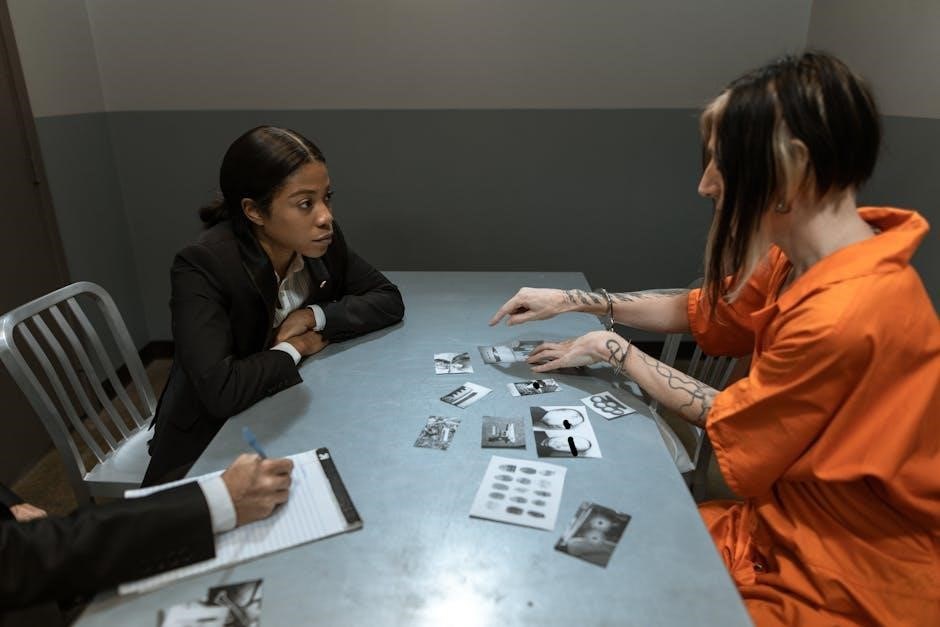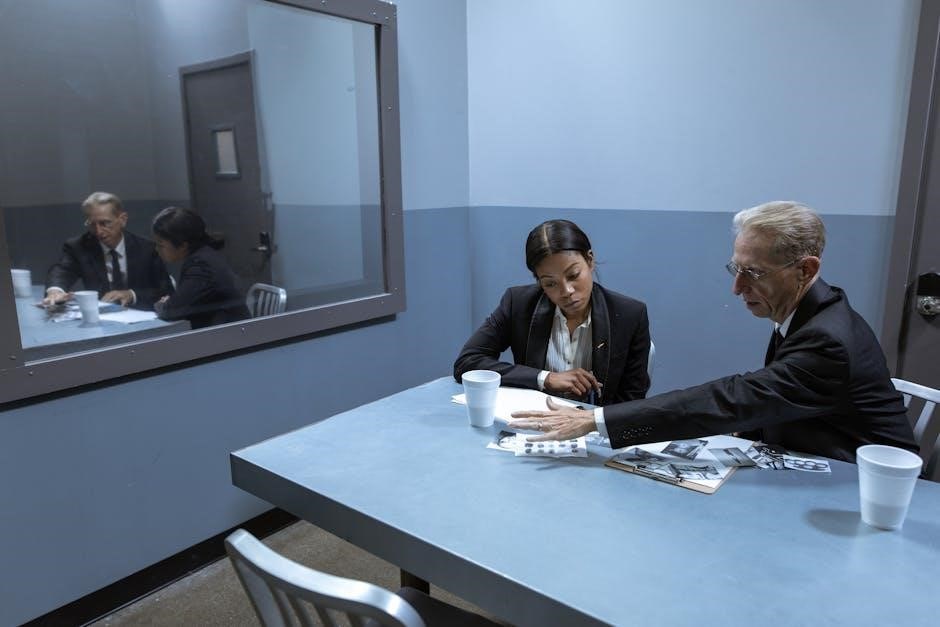Police competency-based interviews assess specific skills and experiences to evaluate candidates’ suitability for roles. They focus on real-life examples, using techniques like the STAR method to demonstrate key competencies effectively;
What Are Competency-Based Interviews?
Competency-based interviews are a structured assessment method used to evaluate candidates’ skills, behaviors, and experiences. They focus on specific competencies required for a role, such as communication, problem-solving, or leadership. In policing, these interviews aim to identify individuals who can demonstrate practical examples of how they have applied these skills in real-life situations. Questions are designed to assess how well candidates align with the values and responsibilities of the police force. By using techniques like the STAR method, candidates provide detailed, structured responses that highlight their past actions and decisions. This approach ensures that the selection process is fair, transparent, and effective in identifying suitable candidates for demanding law enforcement roles.
Why Competency-Based Interviews Are Important in Policing
Competency-based interviews are crucial in policing as they ensure candidates possess the essential skills and values required for the role. These interviews evaluate real-life examples of decision-making, teamwork, and problem-solving, which are critical for police officers. By focusing on specific competencies, such as communication and adaptability, they help predict how candidates will perform in challenging situations. This method also promotes fairness and transparency in the selection process, ensuring that only the most suitable individuals progress. Additionally, these interviews align with the values of the police force, fostering a culture of accountability and professionalism. They provide a robust framework for identifying candidates who can uphold the high standards expected in law enforcement, making them indispensable in modern policing recruitment.
Key Competencies Assessed in Police Interviews
Police interviews focus on evaluating core competencies such as communication, decision-making, problem-solving, and teamwork. These skills are vital for officers to handle complex situations effectively. Communication skills ensure clear interactions with the public and colleagues, while decision-making and problem-solving abilities reflect an officer’s capacity to act under pressure. Teamwork and collaboration are essential for joint operations, and leadership skills demonstrate the ability to guide others in challenging scenarios. Adaptability and resilience are also assessed, as officers must navigate unpredictable environments. Additionally, emotional intelligence and ethical judgment are critical to maintain public trust and uphold professional standards. By assessing these competencies, police interviews aim to identify candidates who can excel in demanding roles and contribute positively to community safety and justice.

Preparing for Police Competency-Based Interviews
Effective preparation involves researching the police force, understanding the STAR method, and practicing common questions to showcase relevant skills and experiences confidently.
Researching the Police Force and Role
Researching the police force and role is crucial for a successful interview. Understanding the force’s mission, values, and specific requirements helps tailor answers to align with their expectations. Candidates should review the job description and person specification to identify key competencies. Additionally, staying informed about current policing issues and challenges demonstrates enthusiasm and readiness. Utilizing official websites, annual reports, and recruitment materials provides valuable insights. This preparation enables candidates to connect their experiences and skills directly to the role, showcasing their suitability effectively. It also highlights their commitment to understanding the force’s unique needs and priorities.
Understanding the STAR Method for Answering Questions
The STAR method is a structured approach to answering competency-based questions effectively. It stands for Situation, Task, Action, and Result. Candidates begin by setting the context with a specific situation. Next, they explain the task or challenge they faced. Then, they describe the actions they took to address it, focusing on their role and responsibilities. Finally, they conclude with the outcome or result of their actions. This method ensures clarity and conciseness, allowing interviewers to assess key competencies clearly. By using the STAR technique, candidates can provide well-organized and impactful responses, demonstrating their skills and experiences effectively. Proper use of this method enhances the quality of answers and improves the chances of a successful interview.
Practicing Common Competency-Based Questions
Practicing common competency-based questions is crucial for excelling in police interviews. Candidates should familiarize themselves with frequently asked questions related to communication, teamwork, and decision-making. Utilizing resources like police competency-based interview questions and answers PDFs provides valuable insights. These guides often include sample questions, model answers, and tips, helping candidates understand expected standards. Regular practice sessions, either alone or with mock interviews, enable candidates to refine their responses. Focusing on behavioral examples and structuring answers using methods like STAR ensures coherence. By identifying and addressing weaknesses, candidates can present themselves more effectively. Diligent practice not only builds confidence but also ensures that candidates can articulate their experiences clearly, demonstrating their suitability for the role. Consistent preparation is key to making a positive impression during the interview.

Common Police Competency-Based Interview Questions
Questions often focus on communication, decision-making, teamwork, leadership, and adaptability. Candidates can find comprehensive lists and guides in police competency-based interview questions and answers PDF resources online.
Questions on Communication Skills
Communication skills are vital for police roles, requiring clear and effective interactions. Questions may include scenarios like explaining complex information to someone upset or de-escalating a tense situation. Candidates are often asked to describe times when they had to convey information clearly or listen actively in high-pressure environments. Demonstrating the ability to adapt communication styles to different audiences is key. For example, “Tell us about a time you had to communicate a difficult message” or “Describe how you ensure your message is understood by everyone.” Using the STAR method to structure responses is essential, focusing on the situation, task, action, and result. Practicing these types of questions with example answers from reliable PDF guides can help build confidence and improve performance during the interview, ensuring candidates showcase their communication abilities effectively.
Questions on Decision-Making and Problem-Solving
Decision-making and problem-solving skills are critical for police officers, as they often face high-pressure situations requiring quick, logical, and ethical decisions. Common questions include scenarios like resolving conflicts, handling emergencies, or making tough choices with limited information. Candidates may be asked, “Describe a time you had to make a difficult decision under pressure” or “Tell us about a situation where you solved a complex problem.” It’s important to provide specific examples from past experiences, using the STAR method to structure responses. Practicing with sample questions from reliable PDF guides helps refine answers, ensuring they highlight clear thinking, prioritization, and effective outcomes. Demonstrating the ability to weigh options, consider consequences, and act decisively is essential for success in these interviews.
Questions on Teamwork and Collaboration
In police interviews, teamwork and collaboration questions assess how well candidates work with others to achieve common goals. Example questions include, “Describe a time you worked in a team to solve a problem” or “Tell us about a situation where you had to collaborate with someone difficult.” Candidates should provide specific examples from past roles, using the STAR method to highlight their contributions. It’s important to emphasize active listening, adaptability, and how they supported team objectives. Practicing with PDF guides can help structure responses effectively, showcasing the ability to build rapport and work cohesively within diverse groups. Demonstrating a willingness to contribute, communicate openly, and support colleagues is crucial for success in these interviews.
Questions on Leadership and Initiative
Leadership and initiative questions in police interviews focus on candidates’ ability to lead, inspire, and take charge without being asked. Examples include, “Tell us about a time you led a team” or “Describe a situation where you took initiative without supervision.” Candidates should use the STAR method to illustrate their experiences, highlighting clear goals, actions taken, and positive outcomes. Emphasizing confidence, decision-making, and the ability to motivate others is key. PDF guides often provide sample answers, but it’s important to tailor responses to personal experiences. Demonstrating initiative shows proactive problem-solving and a commitment to improving processes, which are highly valued in policing roles. Effective leaders in law enforcement inspire trust and collaboration, essential for team success and community safety.
Questions on Adaptability and Flexibility
Adaptability and flexibility are crucial in policing, where officers face unpredictable situations. Questions like, “Describe a time you adjusted to a sudden change,” or “Tell us about a situation where you handled multiple priorities,” are common. Candidates should use the STAR method to show how they navigated challenges, highlighting quick thinking and effective adjustments. Emphasize calmness under pressure and the ability to prioritize tasks. PDF guides offer sample answers, but personal examples are best. Demonstrating flexibility shows a willingness to learn and grow, essential for modern policing. Officers must adapt to new procedures, technologies, and community needs, making this competency vital for success. Highlighting resilience and a positive attitude in such scenarios can make a strong impression during the interview.

Answering Police Competency-Based Interview Questions
Effectively answering competency-based questions requires clear, concise responses with specific examples. Use the STAR method to structure your answers, ensuring you highlight relevant skills and experiences.
Using Personal Experiences to Illustrate Competencies
Using personal experiences is crucial in competency-based interviews as it provides concrete evidence of your skills. For example, describe a situation where you demonstrated leadership or problem-solving. Be specific about your role, actions, and outcomes to show how you applied the competency effectively. This approach helps interviewers assess your ability to handle real-life scenarios. Always relate your experiences to the policing context, ensuring they align with the force’s values. Practicing how to articulate these examples clearly will enhance your performance and make your answers memorable. Remember, the goal is to showcase not just what you did, but how you did it and what you learned.
Providing Specific Examples from Past Roles
When answering competency-based questions, providing specific examples from past roles is essential. For instance, if asked about teamwork, describe a situation where you collaborated with others to achieve a goal. Be detailed about your responsibilities, actions taken, and the outcome. This approach demonstrates your practical application of skills. Use the STAR method to structure your response: Situation, Task, Action, Result. Avoid vague statements and focus on measurable achievements. Highlight how your actions directly contributed to the success of the team or organization. This will show your capability and readiness for the demands of policing. Always ensure your examples align with the competencies required for the role.
Showing Self-Awareness and Reflection
Demonstrating self-awareness and reflection is crucial in police interviews. Acknowledge your strengths and areas for growth, showing maturity and a commitment to improvement. For example, discuss a challenging situation where you learned from a mistake. Explain what you would do differently now, highlighting personal development. Reflect on how these insights prepare you for policing challenges. Use specific examples to illustrate your ability to analyze your actions and their impact. This shows readiness to handle the emotional and ethical demands of the role. By being honest and introspective, you build trust and credibility with the interview panel. Always link your reflections to how they enhance your ability to serve effectively in law enforcement.

Tips for Success in Police Competency-Based Interviews
Success in police interviews requires thorough preparation. Research the force, practice the STAR technique, and demonstrate passion for policing. Stay calm, confident, and focused during the interview.
Researching the Police Force and Its Values
Researching the police force and its values is crucial for interview success. Understanding the organization’s mission, ethics, and priorities helps align your answers with their expectations. Review their website, annual reports, and recent news to gain insights. Familiarize yourself with their core values, such as integrity, community focus, and professionalism. This knowledge enables you to tailor your responses, demonstrating how your skills and experiences align with their goals. Additionally, understanding the force’s specific challenges and initiatives can help you provide more relevant examples during the interview. This preparation shows your commitment and genuine interest in joining the force, making your application stand out.
Practicing the STAR Technique
Mastering the STAR (Situation, Task, Action, Result) technique is essential for structuring clear and concise responses in police competency-based interviews. Start by identifying a relevant situation from your experience, then explain the task you faced. Next, describe the specific actions you took, emphasizing your role and skills. Finally, highlight the positive outcome or result of your actions. Practice applying the STAR framework to common competency-based questions, such as teamwork or problem-solving scenarios. Use real-life examples from your past roles to demonstrate your abilities effectively. Regularly reviewing and refining your responses will enhance your confidence and clarity during the interview. This method ensures your answers are focused, professional, and aligned with the competencies the police force is seeking.
Demonstrating Passion for Policing
Demonstrating Passion for Policing
Expressing a genuine passion for policing is crucial during competency-based interviews. Highlight your motivation for joining the force by sharing personal experiences or inspirations that sparked your interest in law enforcement. Discuss how your values align with those of the police service, such as protecting communities, upholding justice, and making a positive impact. Provide examples of how you’ve engaged in activities that reflect your commitment, such as volunteering, community work, or relevant coursework. Emphasize your desire to contribute to public safety and your enthusiasm for the challenges and responsibilities of the role. Authenticity is key—interviewers want to see your dedication and understanding of the policing profession. Sharing your passion effectively can set you apart as a candidate who is genuinely invested in the role. This enthusiasm, combined with your skills, will demonstrate your readiness to excel in policing.
Staying Calm and Confident During the Interview
Remaining calm and confident is essential for acing police competency-based interviews. Take deep breaths before answering questions to maintain composure. Practice positive visualization to build self-assurance. Prepare thoroughly by rehearsing answers to common questions, ensuring you feel ready for any scenario. Arrive early to familiarize yourself with the setting, reducing pre-interview nerves. Use the STAR method to structure your responses clearly and concisely. Avoid rushes in speaking—pauses for clarity are better than stumbling. Show enthusiasm for the role while staying professional. Remember, confidence stems from preparation and self-belief. Demonstrating calmness under pressure reflects the resilience needed in policing. By staying composed, you’ll make a strong, positive impression on the interview panel.

Police Competency-Based Interview Questions and Answers PDF
Accessing police competency-based interview questions and answers PDFs provides structured guidance, helping candidates prepare effectively for assessments. These resources often include sample questions and ideal responses, enabling practice and understanding of expected competencies.
Where to Find Reliable Resources
Reliable resources for police competency-based interview questions and answers PDFs can be found on official police force websites, career services platforms, and reputable online forums. These sources often provide validated materials tailored to specific police roles, ensuring relevance and accuracy. Additionally, professional organizations and educational institutions may offer comprehensive guides that align with modern policing standards. Utilizing these resources helps candidates gain insights into expected competencies and prepare effectively for their interviews.
How to Use PDF Guides Effectively
To maximize the benefit of police competency-based interview PDF guides, start by thoroughly reviewing the content to identify key competencies and common questions. Practice answering questions using the STAR method, ensuring each response is structured and detailed. Focus on aligning your answers with the values and requirements of the specific police force. Regularly review and revise your responses to improve clarity and confidence. Additionally, use the guides to familiarize yourself with the interview format and timing, simulating real interview scenarios to enhance preparedness. Consistent practice with these materials will significantly improve your performance during the actual interview.

Key Differences Between Generic and Police-Specific Resources
Generic interview guides often cover broad competencies like communication and teamwork, while police-specific resources focus on law enforcement scenarios and values. Police guides emphasize legal knowledge, ethical decision-making, and situational awareness. They include questions tailored to policing challenges, such as handling emergencies or community interactions. Police-specific PDFs also highlight the importance of behavioral examples relevant to law enforcement roles. These resources are more aligned with the unique demands of policing, making them indispensable for candidates seeking roles in this field. Using police-specific materials ensures preparation is targeted and relevant, increasing the likelihood of success in competency-based interviews.

Common Mistakes to Avoid in Police Interviews
Not tailoring answers to competencies, providing vague responses, and lacking behavioral examples are frequent errors. Candidates must avoid these pitfalls to enhance their chances of success.
Not Tailoring Answers to the Competencies
One of the most common mistakes in police interviews is failing to align answers with the required competencies. Candidates often provide generic responses that do not address the specific skills or qualities the interviewers are assessing. This oversight can make it difficult for interviewers to evaluate a candidate’s suitability for the role. To avoid this, it is crucial to thoroughly research the competencies listed in the job description and ensure every answer directly relates to them. For example, if the competency is “decision-making,” candidates should provide clear examples of times they made sound judgments under pressure. Practicing with the STAR method and reviewing common questions can help candidates stay focused and relevant during the interview.
Providing Vague or Generic Responses
Providing vague or generic responses is a significant pitfall in police competency-based interviews. Interviewers are looking for specific examples that demonstrate a candidate’s skills and experiences. Generic answers fail to provide meaningful insights, making it difficult for assessors to evaluate a candidate’s suitability. For instance, stating “I work well in a team” without providing a concrete example of teamwork or collaboration is unhelpful. To avoid this, candidates should prepare detailed, real-life examples using the STAR method (Situation, Task, Action, Result). Practicing with common competency-based questions and reviewing PDF guides on police interviews can help candidates refine their responses, ensuring they are clear, relevant, and impactful. Specific examples showcase a candidate’s problem-solving abilities and alignment with the role’s requirements.
Overlooking the Importance of Behavioral Examples
Overlooking the importance of behavioral examples is a common mistake in police competency-based interviews. Behavioral questions require candidates to provide specific, real-life examples that demonstrate their skills and competencies. Without these examples, it becomes challenging for interviewers to assess how a candidate might perform in similar situations. Candidates should prepare by reflecting on past experiences and structuring their responses using the STAR method (Situation, Task, Action, Result). This approach ensures clarity and relevance, showcasing how they applied competencies like decision-making or problem-solving. Practicing with sample questions from reliable PDF guides can help candidates avoid this mistake, ensuring they provide detailed, impactful responses that align with the role’s requirements.
Police competency-based interviews require careful preparation and a deep understanding of key competencies. Continuous practice, self-reflection, and staying positive are essential for success in this challenging process.
Final Tips for Acing Police Competency-Based Interviews
To excel in police competency-based interviews, focus on understanding the role and practicing the STAR technique. Stay calm, demonstrate passion for policing, and provide clear, specific examples from your past experiences. Research the police force’s values and tailor your answers to align with their competencies. Avoid generic responses and emphasize self-awareness and reflection. Continuous preparation and persistence are key to standing out as a candidate. Utilize reliable resources, such as police-specific PDF guides, to refine your approach and ensure you are well-prepared for the interview process. Remember, confidence and a positive attitude will significantly enhance your performance.
The Importance of Continuous Preparation
Continuous preparation is crucial for success in police competency-based interviews. Regularly reviewing and practicing common questions ensures readiness and confidence. Utilize PDF guides to access tailored questions and model answers, helping you refine your responses. Reflect on past experiences to align them with key competencies, enhancing your ability to provide specific examples. Practice the STAR technique consistently to structure your answers effectively. Stay updated on the police force’s values and adapt your preparation accordingly. By dedicating time to ongoing practice and review, you can improve your performance and increase your chances of acing the interview. Consistent effort ensures that you present yourself as a well-prepared and capable candidate.
Staying Positive and Persistent
Staying positive and persistent is essential when preparing for police competency-based interviews. A positive mindset helps maintain focus and composure, even in the face of challenges. Persistence ensures that setbacks or rejections do not discourage you from pursuing your goal. Embrace feedback as an opportunity to improve and refine your approach. Surround yourself with supportive individuals who encourage your efforts. Believe in your abilities and the value you bring to the role. Persistence demonstrates resilience, a key trait for policing. By maintaining a positive outlook and staying committed, you can overcome obstacles and increase your chances of success in the interview process. Remember, determination and perseverance are vital in achieving your goal of becoming a police officer.



